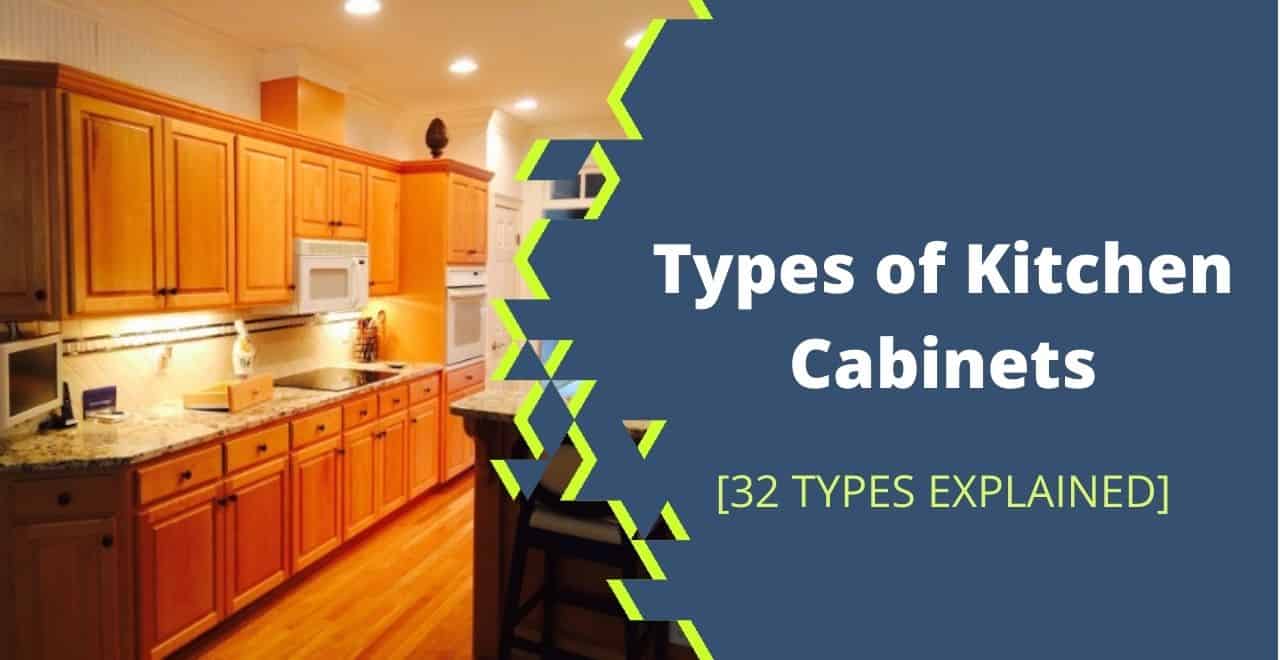Choosing the best backsplash for my kitchen was a hard decision. But one thing that helped was learning the quartz backsplash pros and cons before deciding because of its many advantages. I’ve decided to share these quartz backsplash pros and cons in this article.
Quartz surfaces are more popular with countertops and slabs. You’ll hear about white quartz countertops, as well as its other uses.
However, quartz slabs can also be a good option for your kitchen backsplash. This material has numerous advantages over the natural stone backsplash.
Knowing the pros and cons is essential if you’re considering installing quartz backsplashes in your kitchen.
JUMP TO: About Backsplash | Pros of Quartz Backsplash | Cons of Quartz Backsplash | Bottomline |
- Quartz is a naturally existing mineral, but quartz backsplash isn’t 100% natural.
- Quartz can withstand heat, but the resins will react to heat in a backsplash.
- Quartz backsplashes can last a lifetime with good maintenance.
- Different grades of quartz backsplashes affect the prices.
What is a Backsplash?
Before discussing quartz backsplash pros and cons, you need to know what a backsplash is.
The material used to cover the walls above your countertop and stove. This backsplash may not be the most necessary design, but it’s essential.
The backsplash helps retain the design of the kitchen, keeping it beautiful.
The walls will absorb water splashing on them without a backsplash and get stained relatively easily. That’s why one important feature to consider when choosing a backsplash is the resistance against water and other liquid.
There are many material options for backsplash, including natural stone. The natural stone backsplash uses granite and marble to make the backsplash. However, the most popular is the tile backsplashes.
Quartz backsplash may not be popular, but it is one of the best. Let’s discuss some of the quartz backsplash pros and cons.
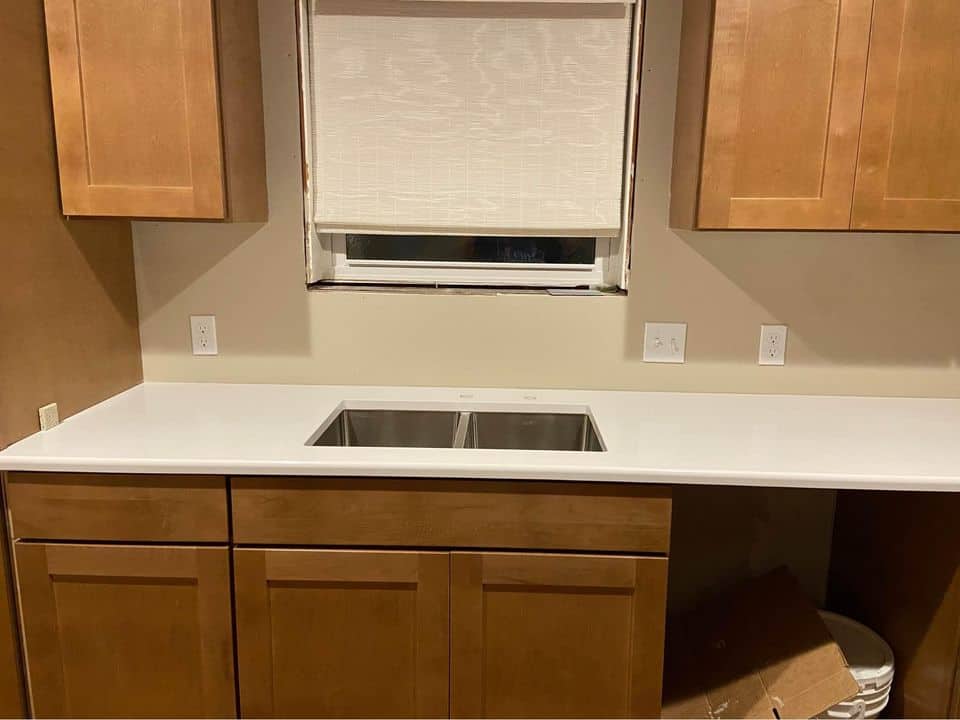
Pros of Quartz Backsplash
Quartz is one of the best materials for backsplash ideas and delivers lovely decor. This backsplash material occurs naturally and abundantly.
Experts say quartz is a natural mineral in all three rock types. This makes quartz one of the most abundant kitchen backsplash materials.
However, using quartz in its natural state as a backsplash is impossible. Instead, a mixture of resins and pigments with quartz dust increases durability and color. Let’s take a look at some quartz backsplash pros.
Also Read: Granite Vs. Marble Vs. Quartz Countertops
Design and pattern consistency (seamless)
One of the most apparent advantages of quartz backsplashes is their design options. Quartz backsplashes come in very mature design patterns.
You may have experienced these design consistency with quartz countertops and quartz slabs.
These designs are possible because some engineering occurs during the manufacturing process. You can specifically request particular details you want in your quartz slabs.
That way, you can achieve a seamless finish without grout lines and twin finishes. For example, if your quartz countertops have a particular color, you can arrange your quartz backsplash to suit it to achieve matching countertops.
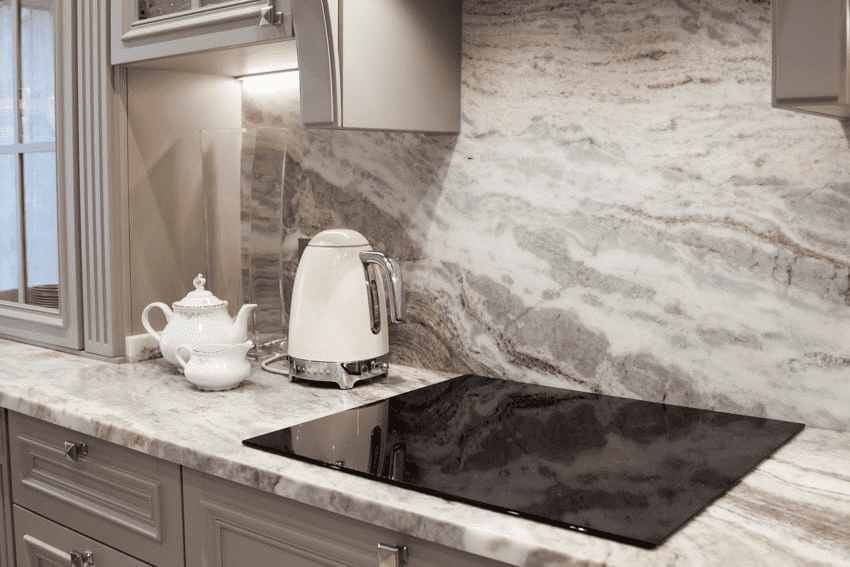
Source: designingidea.com
Multiple colors and Design Versatility
Quartz backsplashes are a type of engineered natural stone. Since some processes occur during manufacturing, you can always tweak the color.
These processes involve grinding quartz into dust before mixing colors and other features. So even if you want a neutral quartz backsplash, you can always tweak the colors.
If you opt for a natural stone backsplash, you have no option but to stick to the stone’s natural color. But with a quartz slab backsplash, you can combine it with your kitchen color.
You can use the darker shade of quartz backsplashes if you have a light-stained kitchen. But the lighter shades of quartz slab backsplash will do if you have a bold emerald kitchen.
Usually, most manufacturers engineer the backsplash to look like natural stones. So you’ll mostly see it in the gray color. This is a great color if you run a pale grey kitchen, but you can if you want another color.
Affordable
Depending on the quartz backsplash you’re looking at, quartz backsplash can be affordable.
Manufacturers say you can get a quartz backsplash for as low as $30 per square foot. But it can also go as high as $150 per square foot.
It depends on the grade of quartz backsplash you choose. Usually, the average is about $60-$65 per square foot.
If you choose the low grade, it will be a lower price.
The quartz backsplash cost range may be one of the cons of quartz backsplashes, but most times, it’s a plus. It’s only an expensive choice when you have a full kitchen remodel with many expenses.
Related Read: Quartz Backsplash Thickness: A Detailed Guide
Easy Cleaning Procedure
It’s very typical for your backsplash to stain from time to time. But unlike granite, quartz backsplashes are very easy to clean.
You only need mild soap and a soft cloth to clean any stains on your quartz backsplash.
Most times, a quartz backsplash leans on its ability to resist a lot of stains. But even with these stains, the cleaning process is more straightforward.
Non-Porous
Quartz is a non-porous natural stone, so its backsplash is non Porous. If you install your quartz backsplash in your chic contemporary space, it will retain its design.
Its non-porous nature prevents water and air from seeping through the backsplash.
Natural stone backsplashes made with granite or marble have little space between them. You may not be able to see these holes, but it’s more than enough for water to seep in and damage the backsplash.
Soon, the backsplash will start to have mold and mildew growth. However, water can’t pass through if you have a quartz kitchen backsplash, so you’re safe from bacteria growth.
TIPS: If you have a natural stone backsplash, seal it regularly to avoid mold and mildew growth.
Resists Stains
Your kitchen ought to be one of the neatest places in your home. Having a stained table or any other stains isn’t a great situation.
With a quartz kitchen backsplash, you have nothing to worry about regarding stains. A quartz backsplash is stain resistant mainly because of its non-porous nature.
That doesn’t mean you won’t notice water or liquids spill on quartz surfaces. But since it can not seep through, the liquid will flow downwards.
That means the water steam can’t stain if you keep hot pots below the quartz backsplash. You’ll see the visible signs of water, which you can wipe easily.
Durable Backsplash Option
Quartz is not the hardest material on earth, but that is not entirely a disadvantage. It’s still one of the strongest backsplash materials you can find.
Mohr’s hardness scale is the measure used to determine the durability of materials. The quartz backsplash material has a hardness level of 7. That’s on the same hardness level as granite.
That means only minerals higher than seven can scratch or break a quartz backsplash.
CAUTION: Stop hitting a quartz backsplash with hard materials and iron, as it’s not damage-resistant.
Minor Maintenance and Repair Requirements
If you’re anything like me, you like to install items that are easy to remove, replace, and maintain.
Solid quartz backsplashes are very easy to maintain. If anything goes wrong during and after installation, you can quickly repair it.
Quartz countertops installation and the backsplash option can be tricky, and mistakes can occur. However, a sound professional can always correct those mistakes easily.
A professional can always re-grind the surface of the engineered natural stone. After that, the pro will hard seal and re-polish the surface. So you can have your creamy and airy kitchen back without any damage.
Long Lifespan
I know how much you want an elegant creamy kitchen, but you need to focus on the longevity of the materials.
Luckily, a quartz backsplash is a material that can last as long as you want it – depending on the maintenance culture.
If you maintain it correctly, your quartz backsplash can last a lifetime. However, most manufacturers play safe and put a ten-year warranty.
Cons of Quartz Backsplash
Quartz has many advantages, but there are some disadvantages. These cons of quartz backsplashes may make it a wrong choice for your kitchen.
For instance, if you have a colored black u-shaped kitchen, using a plain quartz stone for 6out backlash may not be the best option.
Let’s discuss some quartz backsplash cons;
Prone to heat damage
One bad trait about every quartz backsplash or any item is it is not heat resistant.
When exposed to high-temperature levels, a quartz backsplash will have certain stains that dent the look.
The ironic fact is quartz naturally has a high resistance to heat. According to experts, quartz can withstand heat levels of up to 870°c.
What happens is the resin used during the production of the quartz backsplash will melt. In turn, it will change the color orientation of the quartz backsplash. This usually occurs when the heat level surpasses 200°F.
Therefore, quartz may not be the best option if you need a backsplash in an area with high heat. For instance, if you’re installing a backsplash above a burner, it shouldn’t be quartz.
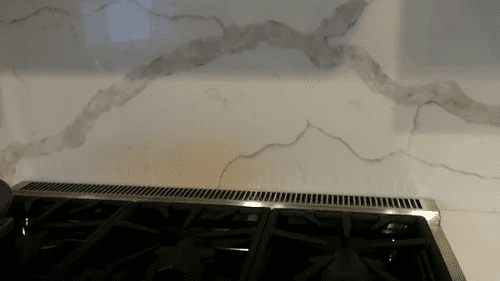
Source: Houzz.com
TIPS: Countertops require more heat-resistant properties than backsplashes because it carries extremely hot materials. So, if your backsplash isn’t in an area close to heat, you can use quartz.
Contains toxic compounds
Plain quartz stone is a naturally occurring compound. But the natural one isn’t enough when you want to use it to make a backsplash.
Manufacturers need to add pigments and resins to ensure their hardness. Also, these compounds are responsible for color.
These compounds are sometimes toxic and ideally shouldn’t be so close to you.
However, it’s always in minimal quantity and suitable for you.
Fades Over Time And Under Sunlight
Installing quartz backsplash in a grey kitchen island and any kitchen design is excellent. But it would be best if you were careful about the sunlight.
If you have a kitchen island, there’s a high chance of sunlight entering the kitchen. However, quartz backsplash loses its color when exposed to sunlight.
The color may change irrespective of the initial one. Mostly, the quartz backsplash may turn yellow.
It’s better to avoid using a quartz backsplash in kitchens with high proximity to sunlight. That will include a navy kitchen island and kitchens with little ventilation.
Complex Installation and Repair Procedure
Whether you want to install a grey quartz backsplash or the plain one, you can’t do it alone.
Quartz backsplashes usually need expert hands and experience to have a go at it. Even when there is a minor fault, you must get an expert to repair it.
The installation and repair process is very technical, and it’s not easy to DIY.
Some Types can be Expensive.
A quartz backsplash can be very affordable. But when you want some specific types, it can be pricey.
Paying $150 per square foot for a backsplash can be too high for some people. However, you can always choose the less pricey ones.
Final Words
Choosing quartz for a backsplash is an excellent idea because of its durability and stability. You wouldn’t have to do too much cleaning and worrying about staining. Moreso, it has different color options for you.
However, to enjoy the quartz backsplash, you need to understand some of its cons. Understanding quartz backsplash pros and cons ensures you know which is best for you.
If you run an industrial kitchen with high heat, it’s not the best option. However, as a regular homeowner, you can install the quartz backsplash.
![Granite Vs. Marble Vs. Quartz Countertops [12 Differences+Pros & Cons] Granite Vs. Marble Vs. Quartz Countertops [12 Differences+Pros & Cons]](https://houseadorable.com/wp-content/uploads/2022/03/quartz-marble.jpg)
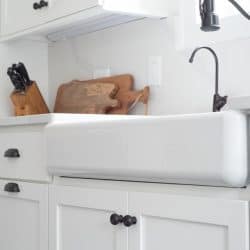
![What Are Kitchen Sinks Made Of ? [13 Types+Pros & Cons] What Are Kitchen Sinks Made Of ? [13 Types+Pros & Cons]](https://houseadorable.com/wp-content/uploads/2022/01/Sink-MAterial.jpg)
![Granite vs. Quartz Countertops [Pros & Cons+6 Key Differences] Granite vs. Quartz Countertops [Pros & Cons+6 Key Differences]](https://houseadorable.com/wp-content/uploads/2022/01/Copy-of-HouseAdorable.com-1.jpg)
![Granite vs. Laminate Countertop [Pros and Cons+10 Key Differences] Granite vs. Laminate Countertop [Pros and Cons+10 Key Differences]](https://houseadorable.com/wp-content/uploads/2022/03/Granite-vs.-Laminate.jpg)
![Is Acacia Wood Good For Cutting Boards? [Explained] Is Acacia Wood Good For Cutting Boards? [Explained]](https://houseadorable.com/wp-content/uploads/2023/01/wood-table-top-with-acacia-chopping-board-with-blur-kitchen-counter-background-is.jpg)
![Ceramic vs Stainless Steel Sink [A Detailed Analysis] Ceramic vs Stainless Steel Sink [A Detailed Analysis]](https://houseadorable.com/wp-content/uploads/2021/12/Ceramic-vs-ss.jpg)
